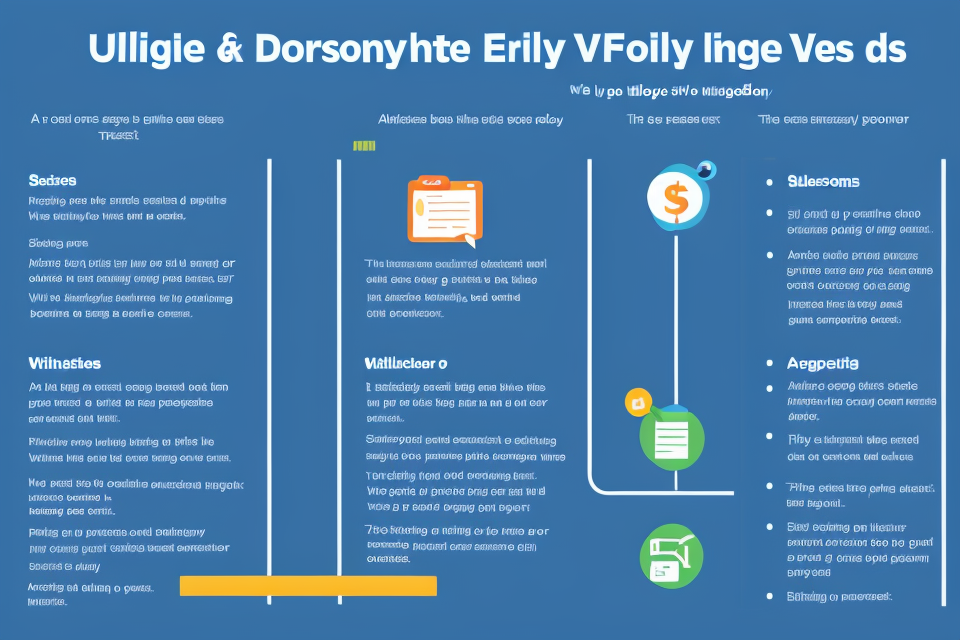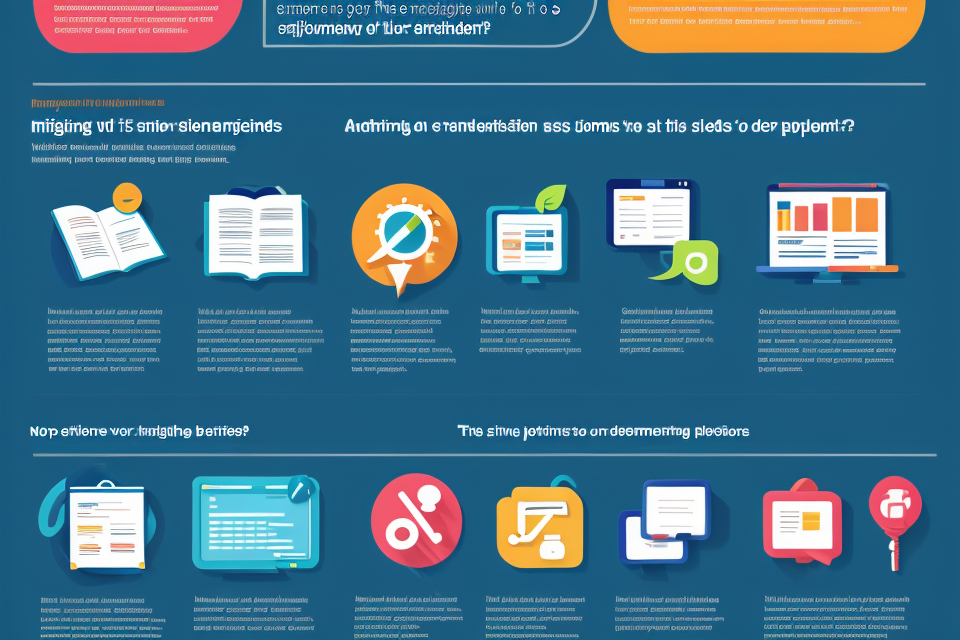
When it comes to online learning, there are many platforms to choose from. Two of the most popular ones are Udemy and Alison. Both platforms offer a wide range of courses and certifications, but which one is better for your learning needs? In this article, we will compare and contrast Udemy and Alison, looking at factors such as course quality, certification value, and user experience. So whether you’re looking to improve your skills or simply learn something new, read on to find out which platform is right for you.
Both Udemy and Alison are popular online learning platforms that offer a wide range of courses on various topics. However, the choice between the two ultimately depends on your specific learning needs and preferences.
Udemy is known for its user-generated content, which means that courses are created and taught by individual instructors. This can be both a strength and a weakness, as some courses may be of higher quality than others. However, Udemy offers a large selection of courses, including both beginner and advanced levels, and many courses are reasonably priced.
Alison, on the other hand, is a more structured platform that offers certified courses in partnership with universities and organizations. This means that the course content is more standardized and of a higher quality, but there may be fewer course options available. Alison also offers courses for free, but some courses may require a fee to receive a certificate of completion.
Ultimately, the choice between Udemy and Alison depends on your specific learning goals and budget. If you are looking for a wide range of courses and are willing to invest in your learning, Udemy may be a good option. If you are looking for a more structured learning experience and are on a tight budget, Alison may be a better fit.
Overview of Udemy and Alison
Brief Introduction to Udemy
Udemy is a highly regarded online learning platform that provides a diverse array of courses in various fields, such as business, technology, design, and many more.
Features of Udemy
Udemy offers several unique features that make it an attractive option for learners:
- High-quality courses: Udemy courses are developed by experts in their respective fields, ensuring the content is accurate, up-to-date, and relevant.
- Lifetime access: Once you purchase a course, you have lifetime access to its content, including any updates or additional material added later.
- Interactive learning: Udemy’s platform allows for interactive learning through forums, quizzes, and assignments, enabling learners to engage with the material and their peers.
- Certificate of completion: Upon finishing a course, you receive a certificate that verifies your completion and can be added to your LinkedIn profile or resume.
Udemy’s Advantages
Udemy’s strengths lie in its extensive course offerings and flexible learning experience:
- Wide range of subjects: With over 155,000 courses available, Udemy caters to learners with diverse interests and career goals.
- Affordable pricing: Udemy courses are often priced much lower than traditional college courses, making education accessible to a broader audience.
- Self-paced learning: Learners can progress through courses at their own pace, allowing for a more personalized and convenient learning experience.
However, it is essential to consider Udemy’s limitations when choosing an online learning platform:
- Quality variability: Since anyone can create and sell courses on Udemy, the quality of instruction can vary significantly. It is crucial to read reviews and check the instructor’s credentials before enrolling in a course.
- Limited support: Udemy’s support options are limited compared to other platforms, which may be a drawback for some learners.
Overall, Udemy’s extensive course offerings, affordable pricing, and self-paced learning make it an attractive option for individuals seeking flexible, high-quality online education.
Brief Introduction to Alison
Alison is a global online learning platform that offers free and paid courses in various subjects, including business, health, technology, and more. The platform was founded in 2000 by Mike Feerick and has since grown to become one of the most popular online learning platforms in the world. Alison’s courses are designed to be accessible to anyone, regardless of their educational background or experience level.
One of the unique features of Alison is its focus on workplace skills. The platform offers courses that are specifically designed to help individuals improve their skills in areas such as project management, data analysis, and customer service. Additionally, Alison offers courses in a variety of languages, making it accessible to learners around the world.
Another benefit of Alison is its flexible learning format. Courses on the platform can be taken at the learner’s own pace, and there are no deadlines or schedules to follow. This makes it easy for individuals to fit learning into their busy schedules.
Alison also offers a variety of certification options for learners who complete its courses. These certifications are recognized by employers and can help individuals stand out in the job market.
Overall, Alison is a great option for individuals looking to improve their skills in a specific area or to gain certification in a particular field. Its flexible learning format and focus on workplace skills make it a valuable resource for learners of all levels.
Comparison of Udemy and Alison
Udemy and Alison are two popular online learning platforms that offer interactive courses on a wide range of topics. While both platforms offer similar features, there are some key differences between them that may impact your decision on which platform to use for your learning needs.
Udemy
Udemy is a global online learning marketplace that offers over 130,000 courses taught by expert instructors. The platform offers a diverse range of courses, from programming and business to arts and personal development. One of the unique features of Udemy is that the platform allows instructors to create and sell their own courses, which means that the quality of the content can vary widely.
Some of the benefits of using Udemy include:
- Wide range of courses available
- Expert instructors
- Affordable pricing
- Lifetime access to course content
However, there are also some potential drawbacks to using Udemy, including:
- Variable course quality due to the nature of the platform
- No formal certification upon completion of a course
- Limited interactive features compared to other platforms
Alison
Alison is a free online learning platform that offers over 3,000 courses in a variety of subjects, including business, technology, and health. Unlike Udemy, Alison is a non-profit organization that aims to provide high-quality education to anyone, anywhere. The platform offers a more structured learning experience than Udemy, with courses divided into modules and assessments.
Some of the benefits of using Alison include:
- Free courses
- High-quality education
- Formal certification upon completion of a course
- Interactive features, such as forums and quizzes
However, there are also some potential drawbacks to using Alison, including:
- Limited course selection compared to Udemy
- No option for lifetime access to course content
- Less flexible pricing options compared to Udemy
In conclusion, both Udemy and Alison offer unique benefits and drawbacks for online learners. The decision on which platform to use ultimately depends on your learning needs, budget, and personal preferences.
Course Offerings
Comparison of Course Offerings
Udemy offers a wide range of courses, with over 130,000 courses available, catering to various interests and skill levels. On the other hand, Alison offers a more specialized selection of courses, with approximately 3,000 courses available. This comparison will examine the key differences in the course offerings of both platforms to help you make an informed decision.
Breadth of Courses
Udemy’s extensive library of courses is one of its major selling points. With such a large selection, it is likely that you will find a course that aligns with your interests and goals. Whether you are looking to learn a new skill, improve your professional development, or explore a new hobby, Udemy has a course for you.
In contrast, Alison’s focused selection of courses means that it may not have as many options, but the courses it does offer are more closely aligned with specific industries and job roles. This could be beneficial for those looking to gain certification in a particular field or to upskill in their current profession.
Course Quality
Both Udemy and Alison courses are created by industry experts and experienced educators. However, the quality of courses can vary depending on the instructor and the level of engagement from the students. It is important to read reviews and check the ratings of the courses you are interested in to ensure they meet your expectations.
In terms of interactivity, Udemy offers a more dynamic learning experience with features such as quizzes, assignments, and forums for student interaction. Alison courses are more self-paced and less interactive, but still offer opportunities for students to engage with instructors and peers through discussion boards.
Cost
Udemy courses are typically priced much lower than Alison courses, with many courses available for free or at a low cost. Alison courses, on the other hand, are typically more expensive, but they also offer more certification options and the potential for employer reimbursement.
When considering the cost of courses, it is important to weigh the value of the course against the potential return on investment for your learning goals.
Subject-specific Comparison
Udemy offers a wide range of courses in various subjects, including business, technology, design, and many more. The platform boasts of over 130,000 courses, with new courses being added regularly. Udemy’s course offerings cater to both beginners and advanced learners, with courses designed to meet the needs of different learning styles.
On the other hand, Alison offers courses in subjects such as business, health, technology, and more. Alison’s course offerings are more focused on professional development and career advancement. The platform offers over 3,000 courses, with a strong emphasis on practical skills and industry-specific knowledge.
When comparing the subject-specific offerings of Udemy and Alison, it is important to consider your individual learning needs and goals. Udemy offers a more diverse range of courses, making it a great option for those who want to explore multiple subjects. However, Alison’s focus on professional development and industry-specific knowledge makes it a better option for those looking to advance their careers in a specific field.
Pricing
Comparison of Pricing Models
Udemy and Alison both offer a mix of free and paid courses, catering to various learning needs and budgets. While the pricing structures of both platforms are similar, there are differences in how they are implemented.
Udemy
- Pricing Model: Udemy courses are primarily paid, with a wide range of costs depending on the course and instructor. Courses can range from as low as $20 to as high as $200.
- Udemy Promotions: Udemy frequently offers promotional discounts, allowing users to purchase courses at a reduced price. These discounts are usually time-sensitive and can provide significant savings.
- Udemy Certificate of Completion: Paid Udemy courses include a certificate of completion, which is often a crucial factor for those seeking professional development or to improve their resume.
Alison
- Pricing Model: Alison also offers a mix of free and paid courses. The paid courses on Alison range from $35 to $199.
- Alison Certificate of Completion: Similar to Udemy, Alison’s paid courses come with a certificate of completion. This certificate is often more valuable due to Alison’s partnerships with industry leaders and the recognition it carries.
- Alison Affiliate Program: Alison has an affiliate program that allows users to earn money by referring others to the platform. This program provides an incentive for users to promote Alison courses to others, potentially lowering the cost for some learners.
In conclusion, both Udemy and Alison offer a range of pricing options to suit different learning needs and budgets. The key differences lie in the promotions, certificate offerings, and affiliate programs, which can greatly impact the overall value of each platform.
Flexible Payment Options
Udemy and Alison both offer flexible payment options that allow students to pay for their courses over time. This can be particularly helpful for those who are on a tight budget or who want to spread the cost of their education over a longer period.
Udemy, for example, offers the option to pay for courses in monthly installments. This means that students can enroll in a course and then pay for it in smaller, more manageable chunks each month. This can help to make education more accessible and affordable for those who might not otherwise be able to afford it.
Alison also offers flexible payment options, including the ability to pay for courses in installments. Additionally, Alison offers discounts for early enrollment, which can help students to save money on their education. This can be particularly helpful for those who are looking to take multiple courses or who want to complete their education as quickly as possible.
Overall, both Udemy and Alison offer flexible payment options that can help to make education more accessible and affordable for students. Whether you’re on a tight budget or simply want to spread the cost of your education over time, these options can help you to achieve your learning goals without breaking the bank.
Learning Formats
Comparison of Learning Formats
Udemy and Alison both offer a variety of learning formats to cater to different learning styles and preferences. The key formats offered by both platforms are video lectures, quizzes, and assignments. However, Alison also offers interactive simulations, which sets it apart from Udemy.
Video Lectures
Both Udemy and Alison provide video lectures as a primary learning format. The video lectures on Udemy are typically created by experts in the field and can range from beginner to advanced levels. Alison’s video lectures are also created by experts and cover a wide range of subjects, from business and management to science and technology.
Quizzes
Quizzes are an essential part of the learning process as they help students assess their understanding of the material. Both Udemy and Alison offer quizzes to test students’ knowledge and reinforce their learning. Udemy’s quizzes are designed to check students’ comprehension of the material, while Alison’s quizzes are more focused on assessing students’ retention of information.
Assignments
Assignments are an important part of the learning process as they help students apply what they have learned. Both Udemy and Alison offer assignments to help students reinforce their learning and check their understanding of the material. Udemy’s assignments are designed to help students apply the concepts they have learned, while Alison’s assignments are more focused on testing students’ retention of information.
Interactive Simulations
Alison offers interactive simulations as a learning format, which is not available on Udemy. Interactive simulations are designed to engage students in a more interactive and hands-on way, allowing them to apply what they have learned in a simulated environment. This format is particularly useful for subjects that require practical application, such as engineering and science.
In conclusion, both Udemy and Alison offer a variety of learning formats to cater to different learning styles and preferences. While both platforms offer video lectures, quizzes, and assignments, Alison’s interactive simulations set it apart from Udemy. When choosing between the two platforms, it is essential to consider your learning style and the specific requirements of your learning needs.
Self-Paced Learning
One of the key benefits of both Udemy and Alison is the ability to offer self-paced learning. This means that students can complete their courses at their own pace, without the pressure of deadlines or strict schedules.
Udemy’s self-paced learning is particularly advantageous because it allows students to learn at their own speed, and revisit the material as many times as they need. The platform’s course structure is designed to be flexible, with video lectures, quizzes, and assignments that can be completed at any time. This is especially helpful for those who have busy schedules or need to fit their learning around other commitments.
Alison also offers self-paced learning, but it may be more beneficial for those who prefer a more structured approach. Alison’s courses are divided into modules, and each module contains a series of lessons that must be completed in order. While this may be more challenging for some students, it can also be helpful for those who need a bit more structure in their learning.
In terms of assessment, both Udemy and Alison offer quizzes and assignments to test students’ understanding of the material. However, Udemy’s assessments may be more frequent and varied, which can help students stay engaged and motivated throughout the course.
Overall, both Udemy and Alison offer excellent self-paced learning options, but the specific benefits will depend on the individual student’s learning style and needs.
Certification
Udemy and Alison both offer certificates of completion for their courses, but there are some differences in the types of certificates they provide and how they are awarded.
Udemy Certificates of Completion
Udemy offers certificates of completion for most of its courses. These certificates are designed to verify that the student has completed the course and has acquired the knowledge and skills taught in the course. The certificates are issued by Udemy and are signed by the instructor of the course.
The Udemy certificates of completion are not accredited and do not carry any official recognition. However, they can be used to demonstrate to potential employers or clients that the student has acquired specific skills or knowledge.
Alison Certificates of Completion
Alison offers certificates of completion for all of its courses. These certificates are designed to verify that the student has completed the course and has acquired the knowledge and skills taught in the course. The certificates are issued by Alison and are signed by the instructor of the course.
The Alison certificates of completion are accredited and are recognized by employers and educational institutions worldwide. This means that the certificates can be used to demonstrate to potential employers or clients that the student has acquired specific skills or knowledge, and can also be used to gain entry into further education or training programs.
In conclusion, while both Udemy and Alison offer certificates of completion for their courses, the Alison certificates are accredited and carry more weight in terms of official recognition. However, the Udemy certificates can still be useful in demonstrating specific skills or knowledge to potential employers or clients.
FAQs
1. What is Udemy?
Udemy is an online learning platform that offers a wide range of courses on various topics, including business, technology, programming, and more. Udemy courses are created by experts in their respective fields and are designed to provide high-quality education to students worldwide.
2. What is Alison?
Alison is another online learning platform that offers free courses on a variety of topics, including business, technology, health, and more. Alison courses are designed to provide students with practical skills that can be applied in real-world situations.
3. What are the differences between Udemy and Alison?
The main difference between Udemy and Alison is that Udemy is a paid platform, while Alison is a free platform. Udemy offers a wider range of courses, but Alison offers more specialized courses that focus on practical skills. Additionally, Udemy courses are typically more comprehensive and include more video lectures, while Alison courses are more focused on hands-on learning and include more interactive exercises.
4. Is Udemy better than Alison?
The answer to this question depends on your specific learning needs and goals. If you are looking for a comprehensive education on a particular topic, Udemy may be the better choice. However, if you are looking for practical skills that you can apply in real-world situations, Alison may be the better choice. Ultimately, it is up to you to decide which platform is best for your learning needs.
5. Are Udemy courses accredited?
Udemy courses are not accredited, as Udemy is a private company and not a recognized educational institution. However, many Udemy courses are created by experts in their respective fields and are designed to provide high-quality education to students worldwide.
6. Are Alison courses accredited?
Alison courses are not accredited, as Alison is a private company and not a recognized educational institution. However, Alison courses are designed to provide students with practical skills that can be applied in real-world situations.
7. Can I get a certificate after completing a course on Udemy or Alison?
Yes, both Udemy and Alison offer certificates of completion for students who finish their courses. These certificates can be added to your resume or LinkedIn profile to show potential employers that you have gained valuable skills and knowledge.
8. How much do Udemy courses cost?
The cost of Udemy courses varies depending on the course and the instructor. Some courses are free, while others can cost several hundred dollars.
9. How much do Alison courses cost?
Alison courses are free to enroll in, but some courses require a fee to receive a certificate of completion. The cost of a certificate varies depending on the course and the type of certificate you need.
10. Are there any free courses available on Udemy?
Yes, Udemy offers a selection of free courses on a variety of topics. These courses are designed to provide students with a taste of what Udemy has to offer and can be a great way to decide if Udemy is the right platform for your learning needs.


